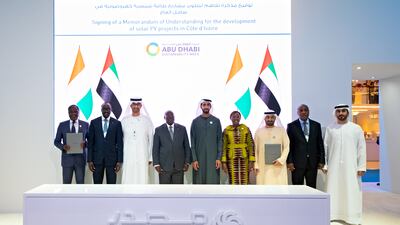Abu Dhabi's clean energy company Masdar has signed an agreement with the Ivory Coast to explore the development of a solar power plant.
Masdar and the Ivory Coast’s Energy and Mining Ministry will look at jointly developing solar photovoltaic plants in the West African country, starting with a project with a capacity that is between 50 megawatts and 70MW, the company said on Friday.
“With Africa’s massive projected development and growth, and low current clean energy penetration levels, we see enormous potential for the renewable energy sector across the continent,” said Masdar chief executive Mohamed Al Ramahi.
“This agreement will support [the Ivory Coast's] clean energy goals and help to drive sustainable economic development for the nation.”
The West African country aims to produce 45 per cent of electricity from clean energy sources by 2030.
The deal is a part of the UAE’s “Etihad 7" programme, which seeks to finance renewable energy projects in Africa, with the aim of reaching a capacity of 20 gigawatts by 2035.
In January, Masdar signed agreements with three African countries to develop renewable energy projects with a combined capacity of up to five gigawatts.
Last year, it signed an agreement with the Tanzania Electric Supply Company to develop renewable energy projects with a total capacity of up to two gigawatts.
Mamadou Coulibaly, the Ivory Coast's Minister of Mining, Petroleum and Energy, said his country had drawn up a master plan for the development of its plants, which integrates solar, hydroelectric and biomass sources.
“The framework agreement [with Masdar] … will contribute, in addition to the other initiatives that the Ivorian government is undertaking, to achieving this ambitious objective,” he said.
Despite efforts to increase power generation in Africa, it remains the least electrified continent in the world, with about 600 million people lacking access.
The Covid-19 pandemic worsened the situation due to lockdowns, supply chain disruptions and the diversion of funds by governments.
The economic impact of the pandemic left more than 30 million people unable to pay for electricity in 2020, mainly in Africa, according to the International Energy Agency.
Between 2000 and 2013, eight million people in Africa gained access to electricity annually. That number tripled to 24 million in the years between 2014 and 2019, the agency has said.
On Thursday, Infinity Power Holding — a joint venture between Egypt’s Infinity and Masdar — and Conjuncta GmbH, a German project developer, signed an initial agreement with Mauritania to develop a green hydrogen project.
The project, which will be spread over four phases, is expected to produce up to eight million tonnes of green hydrogen or other renewable fuels of non-biological origins upon completion.
Masdar is currently active in more than 40 countries and has invested or committed to invest in projects worth more than $30 billion.
The company, which continues to boost its clean energy portfolio, has an ambitious target to grow its capacity to at least 100 gigawatts of renewable energy capacity globally by 2030.
The largest share of this capacity will come from wind and solar technology.
Beyond the initial goals, Masdar also seeks to develop more than 200 gigawatts of renewable energy.
The%20specs
%3Cp%3E%3Cstrong%3EEngine%3A%3C%2Fstrong%3E%206.5-litre%20V12%20and%20three%20electric%20motors%0D%3Cbr%3E%3Cstrong%3EPower%3A%20%3C%2Fstrong%3E1%2C015hp%0D%3Cbr%3E%3Cstrong%3ETorque%3A%20%3C%2Fstrong%3E1%2C500Nm%20(estimate)%0D%3Cbr%3E%3Cstrong%3ETransmission%3A%3C%2Fstrong%3E%20Eight-speed%20dual-clutch%20auto%0D%3Cbr%3E%3Cstrong%3EOn%20sale%3A%3C%2Fstrong%3E%20Early%202024%0D%3Cbr%3E%3Cstrong%3EPrice%3A%20%3C%2Fstrong%3EFrom%20Dh2%20million%20(estimate)%3C%2Fp%3E%0A
THE SPECS
Jaguar F-Pace SVR
Engine: 5-litre supercharged V8
Transmission: 8-speed automatic
Power: 542bhp
Torque: 680Nm
Price: Dh465,071
Top investing tips for UAE residents in 2021
Build an emergency fund: Make sure you have enough cash to cover six months of expenses as a buffer against unexpected problems before you begin investing, advises Steve Cronin, the founder of DeadSimpleSaving.com.
Think long-term: When you invest, you need to have a long-term mindset, so don’t worry about momentary ups and downs in the stock market.
Invest worldwide: Diversify your investments globally, ideally by way of a global stock index fund.
Is your money tied up: Avoid anything where you cannot get your money back in full within a month at any time without any penalty.
Skip past the promises: “If an investment product is offering more than 10 per cent return per year, it is either extremely risky or a scam,” Mr Cronin says.
Choose plans with low fees: Make sure that any funds you buy do not charge more than 1 per cent in fees, Mr Cronin says. “If you invest by yourself, you can easily stay below this figure.” Managed funds and commissionable investments often come with higher fees.
Be sceptical about recommendations: If someone suggests an investment to you, ask if they stand to gain, advises Mr Cronin. “If they are receiving commission, they are unlikely to recommend an investment that’s best for you.”
Get financially independent: Mr Cronin advises UAE residents to pursue financial independence. Start with a Google search and improve your knowledge via expat investing websites or Facebook groups such as SimplyFI.
The specs: 2018 Renault Megane
Price, base / as tested Dh52,900 / Dh59,200
Engine 1.6L in-line four-cylinder
Transmission Continuously variable transmission
Power 115hp @ 5,500rpm
Torque 156Nm @ 4,000rpm
Fuel economy, combined 6.6L / 100km
Wicked: For Good
Director: Jon M Chu
Starring: Ariana Grande, Cynthia Erivo, Jonathan Bailey, Jeff Goldblum, Michelle Yeoh, Ethan Slater
Rating: 4/5
The biog
Favourite book: You Are the Placebo – Making your mind matter, by Dr Joe Dispenza
Hobby: Running and watching Welsh rugby
Travel destination: Cyprus in the summer
Life goals: To be an aspirational and passionate University educator, enjoy life, be healthy and be the best dad possible.
The specs
Engine: 1.6-litre 4-cyl turbo and dual electric motors
Power: 300hp at 6,000rpm
Torque: 520Nm at 1,500-3,000rpm
Transmission: 8-speed auto
Fuel consumption: 8.0L/100km
Price: from Dh199,900
On sale: now
Kibsons%20Cares
%3Cp%3E%3Cstrong%3ERecycling%3Cbr%3E%3C%2Fstrong%3EAny%20time%20you%20receive%20a%20Kibsons%20order%2C%20you%20can%20return%20your%20cardboard%20box%20to%20the%20drivers.%20They%E2%80%99ll%20be%20happy%20to%20take%20it%20off%20your%20hands%20and%20ensure%20it%20gets%20reused%3C%2Fp%3E%0A%3Cp%3E%3Cstrong%3EKind%20to%20health%20and%20planet%3C%2Fstrong%3E%3Cbr%3ESolar%20%E2%80%93%2025-50%25%20of%20electricity%20saved%3Cbr%3EWater%20%E2%80%93%2075%25%20of%20water%20reused%3Cbr%3EBiofuel%20%E2%80%93%20Kibsons%20fleet%20to%20get%2020%25%20more%20mileage%20per%20litre%20with%20biofuel%20additives%3C%2Fp%3E%0A%3Cp%3E%3Cstrong%3ESustainable%20grocery%20shopping%3C%2Fstrong%3E%3Cbr%3ENo%20antibiotics%3Cbr%3ENo%20added%20hormones%3Cbr%3ENo%20GMO%3Cbr%3ENo%20preservatives%3Cbr%3EMSG%20free%3Cbr%3E100%25%20natural%3C%2Fp%3E%0A
Company profile
Company: Verity
Date started: May 2021
Founders: Kamal Al-Samarrai, Dina Shoman and Omar Al Sharif
Based: Dubai
Sector: FinTech
Size: four team members
Stage: Intially bootstrapped but recently closed its first pre-seed round of $800,000
Investors: Wamda, VentureSouq, Beyond Capital and regional angel investors
About%20My%20Father
%3Cp%3E%3Cstrong%3EDirector%3A%20%3C%2Fstrong%3ELaura%20Terruso%3C%2Fp%3E%0A%3Cp%3E%3Cstrong%3EStars%3A%20%3C%2Fstrong%3ERobert%20De%20Niro%2C%20Sebastian%20Maniscalco%2C%20Kim%20Cattrall%3C%2Fp%3E%0A%3Cp%3E%3Cstrong%3ERating%3A%3C%2Fstrong%3E%202%2F5%26nbsp%3B%3C%2Fp%3E%0A
Ferrari 12Cilindri specs
Engine: naturally aspirated 6.5-liter V12
Power: 819hp
Torque: 678Nm at 7,250rpm
Price: From Dh1,700,000
Available: Now

